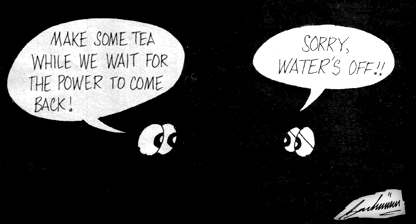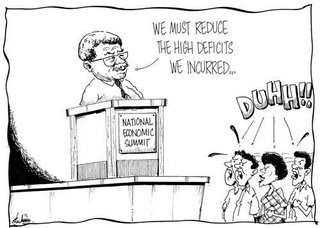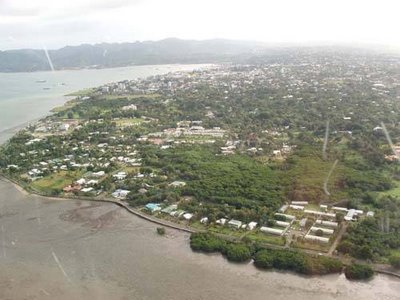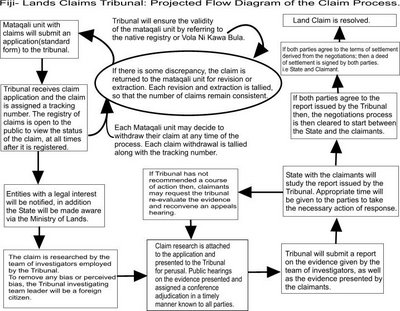
Image above: Commissioner Hughes relishes the rewards for blind obedience.
The embarrasing news thread of diplomatic pouches gone wild, has now officially become an ubiquitous symbol to the scandalous cover up in Fiji; actively contributed to by the Australian Government.
The billigerent and systemic abuse of diplomatic priviledges outlined by the Vienna Protocol of 1961 ratified by the United Nations has now been brought to utter disrepute by Australia.
Vienna Convention document Article No. 27, Clause 4 clearly states:
"The packages constituting the diplomatic bag must bear visible external marks of their character and may contain only diplomatic documents or articles intended for official use".
S.i.F.M believes that, the stainless-steel containers spirited out of Nadi International Airport with the use of Fiji Police liason, were not responsibly marked in any form or function; as seen by the cabin and ground crew of the transiting commericial airline.
Furthermore since, foreign diplomats are extended the right of safe passage under the same Vienna Convention; there is no other justifiable reason why the incoming diplomats are circumnavigating the customs enforcement checks at the Airport terminal. This shady detour of unknown persons debussing flights has become a common occurence in Fiji. A similar occurence happened in Nausori Airport early in 2006.
Fiji Village reports on the questioning of a Protocol Officer employed by the Ministry of Foreign Affairs by representatives of the Army intelligence. This questioning would undoubtedly have prematurely revealed the plans of maliscious intent.
The latest news of Australia's interference with Pacific domestic politics has stepped up unceremoniously to higher levels.
An article from Radio Australia's online magazine called Correspondent's notebook reveals that, this interference by Australia also involves a media component. The author-a relative overnight expert sensationalist of Fiji politics, has added the role of history revisionist to his slim repertoire.
This is the excerpt of the article:
Fiji on coup watch
Monday, 6 November 2006
With all eyes in the Pacific on Fiji, Radio Australia's Foreign Affairs Correspondent, Graeme Dobell, explains how the current crisis has its roots in the in the political chaos that rocked Suva in 2000.
For a really bitter fight, watch what happens when a king maker falls out with the king he created. That's why this battle is so personal - Frank Bainimarama is the military strongman who put Laisenia Qarase on the throne.
This showdown has its roots in the strange saga of the George Speight siege in Suva in 2000. Speight was the frontman and the mouthpiece for the rebels who seized the parliament and held the prime minister, Mahendra Chaudhry, hostage for 56 days.
Speight's coup amounted to little more than a drawn-out criminal act, that cost two lives. The true coups were actually mounted outside the parliament. First the president, Ratu Sir Kamisese Mara, dismissed the Chaudhry Government, because - as hostages - its ministers could not discharge the duties.
But Mara himself was gone within days. Commodore Bainimarama stepped in, abrogated the constitution, imposed martial law, and effectively banished Ratu Mara from Suva, sending him back to his home island.
So we know Fiji's military chief can mount a coup - he's done it once already. The successful coup in 2000 was mounted by Frank Bainimarama, not by George Speight.
The Fiji military is starting to sound like the Indonesian Army under Suharto, when it claimed to have a dual function - political as well as defence.
According to one of Fiji's leading historians, Professor Brij Lal, the three coups in 20 years have caused a militarisation of Fiji's culture: "I think the army sees for itself a permanent role in the broader public sort of life of Fiji, and one officer told me that some of them see Pakistan as a model where the army is because they think they know best what the people want. So I think this tension that is present today between the army and the government won't go away even if you replace Bainimarama."
Perhaps this crisis will do away with one of the lines that has been useful to Suva's elite in stirring trouble - that the political volatility is caused by ethnic tension, the divisions between indigenous Fijians and Indian Fijians.
There is certainly a divide in Fiji's society. But the political fight that causes Fiji to lurch towards coup and crisis is more about the struggle between different elements of the indigenous Fijian community.
Railing against the danger of an economic and political takeover by the Indians plays well in the villages. That was the initial language of the Speight siege, but it quickly became apparent that Speight was really fighting other factions or regions within his own Fijian community.
Or to be crude, arguing about whose snout should be deepest in the trough. In that sense, both Commodore Bainimarama and Prime Minister Qarase present as Fijian chauvinists - they are far too intelligent to be racist.
And unfortunately, the military commander is proving again that Fiji's army has become a powerful tribe, well able to flex its muscle to protect its interests, while proclaiming its own true vision of what is good for Fiji.
On the surface the work by Graeme Dobell- Foreign Correspondent extraordinaire has similar undertones, syntext and talking points with those of the truth-impaired Opinion pages and articles published by Government owned paper: Fiji Daily Post.
The over-reaching of Australia onto the Pacific stage has also revealed that, the Oberfurher role in the regional drama could not be potrayed adequately, than this actor of low morals. Perhaps the Aussie suffering under the 1000 year record drought is an example of universal applications of karma. Along with the negative opinions of Australia's foreign policies by Asian nations.
The option of finding other dominating players with a higher degree of sensitivity, is often the more responsible option that is never removed too far from the Pacific table of negotiations.
Other selected Letters to Fij Times Editor.
Fair dinkum
I was disappointed with the standard of delivery of a news item on the Australia Network on Monday November 6, 2006.
The correspondent, a widely respected journalist in the Pacific, Sean Dorney, delivered a report on the RFMF's take on six Australian nationals who arrived in Nadi with 400kg of "gear" last week.
What I found disconcerting was the fact that his studio back in Australia saw fit to play scenes from a Natabua High School passing out parade during the delivery of his report.
Some one in the ABC video library must have looked under "Fiji" for anything with "guns" in it and submitted it for use with Sean's report.
If some Australians see us as the North Korea of the South Pacific, they really only have themselves to blame. And that's fair dinkum, true blue and dinky-di.
B Hong Tiy
Suva
Naval support
Could Prime Ministers Howard and Clark please explain why no naval vessels or so-called support staff were sent when elected governments were toppled in 1987 and 2000?
Dr Bavadra and Mr Chaudhry were treated so shabbily by these so-called bastions of democracy and given lip-service back then. Such blatant hypocrisy.
If the coup culture had not been perpetuated back then we would not be in the situation we are in today.
It is indeed ironic that the same military, having had exposure to civil wars and injustices in other parts of the world, is making a stand.
Making a stand to wipe out nepotism, corruption, injustice and bigotry, making a stand for good, transparent governance that does not line the pockets of corrupt politicians and greedy businessmen.
What the military espouses is commendable and idealistic. One can only hope that matters are resolved amicably.
D Prasad
Manukau Auckland
Why now
I am surprised to see that Australian Prime Minister John Howard is being so vocal about the army's involvement in the current situation,
I wonder why he did not say the same things he is saying during the coup of 2000?
Emmanuel Pratap
Sydney
Club Em Designs






























